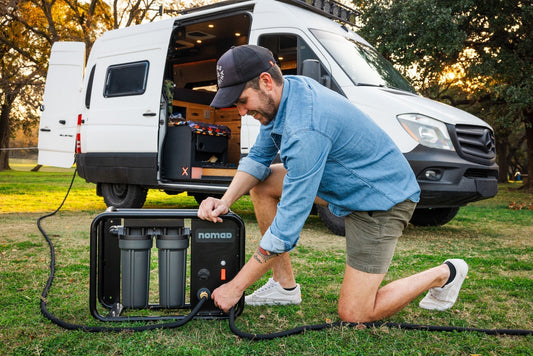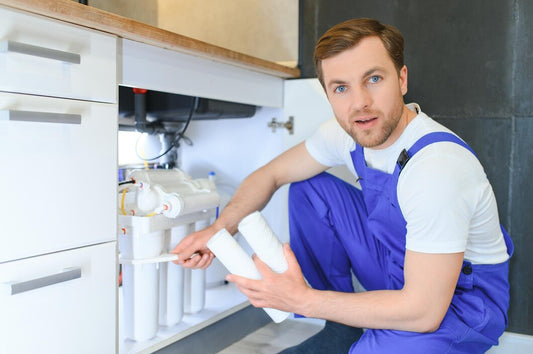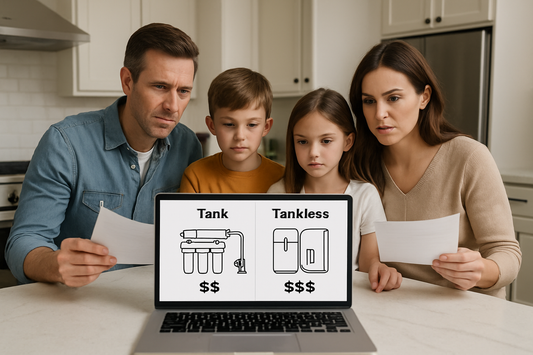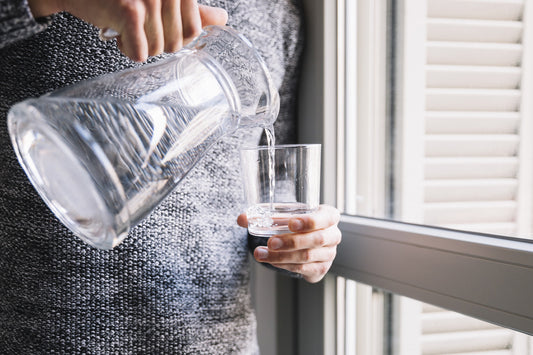You're parked at a stunning lakeside campground, the sun is setting, and you're ready to cook dinner in your motorhome. But when you turn on the tap, murky water with floating particles comes out. Sound familiar? If you're an RV enthusiast, you've probably encountered questionable water quality more times than you'd like to admit.
The truth is, whether you're filling up at a campground spigot or drawing from a natural water source, you never know what's lurking in your water supply. That's where a reliable water filter for motorhome adventures becomes your best travel companion.
Why Every RV Needs a Water Filter System
The Hidden Dangers of Campground Water
Campground water sources can contain everything from sediment and rust to chlorine and bacteria. While most established campgrounds provide treated water, the aging infrastructure and varying maintenance standards mean you're essentially playing water quality roulette every time you hook up.
Here's what commonly flows through those campground spigots:
- Sand, silt, and rust particles from aging pipes
- Chlorine and chemical treatments (often in high concentrations)
- Bacteria and microorganisms from contaminated sources
- Hard water minerals that clog your RV's plumbing
Protecting Your Investment
Your motorhome represents a significant investment, and contaminated water can wreak havoc on your RV's plumbing system. Sediment particles accumulate in your pipes, leading to blockages and reduced water flow. Over time, this causes increased wear and tear, potentially leading to expensive repairs that could have been easily prevented.

Types of RV Water Filter Systems
Portable Water Filter Options
Inline Water Filters These compact filters connect directly to your water hose and are perfect for basic sediment removal. They're affordable, easy to install, and ideal for weekend warriors who primarily stay at established campgrounds.
Benefits:
- Quick setup and removal
- Affordable entry point
- Effective for basic sediment filtration
- Compatible with most RV water systems
Limitations:
- Limited filtration capacity
- May not handle heavy contamination
- Requires frequent replacement
Comprehensive RV Water Filter Systems
Multi-Stage Filtration Units For serious adventurers who venture off the beaten path, multi-stage systems offer comprehensive protection. These systems typically include sediment filters, carbon filters, and sometimes UV sterilization.
Benefits:
- Thorough contamination removal
- Longer lifespan between replacements
- Suitable for questionable water sources
- Professional-grade filtration
Limitations:
- Higher initial investment
- More complex installation
- Requires more storage space
Portable Water Filter Camping Solutions
Gravity-Fed Filters Perfect for boondocking and dry camping, these systems work without electricity, using gravity to push water through multiple filtration stages.
Benefits:
- No power required
- Excellent for off-grid adventures
- High-capacity filtration
- Reliable in remote locations
Limitations:
- Slower filtration rate
- Requires elevation for proper function
- Bulkier storage requirements

Choosing the Right System for Your Adventures
Assess Your Travel Style
Weekend Getaways: If you primarily stay at established RV parks with decent water quality, a basic inline filter might suffice.
Extended Road Trips: For longer adventures across various regions, invest in a multi-stage system that can handle different water quality challenges.
Boondocking Enthusiasts: Off-grid adventurers need robust, gravity-fed systems that don't rely on electrical hookups.
Consider Your RV Size and Setup
The size of your motorhome and your water usage patterns will determine the appropriate filter capacity. Larger RVs with multiple bathrooms and appliances need higher-capacity systems to maintain adequate water flow.
Flow Rate Requirements
Different water filter camping systems offer varying flow rates. Consider your peak usage times – like morning routines or meal preparation – to ensure your system can keep up with demand.
Installation and Maintenance Tips
DIY vs. Professional Installation
While many RV water filter systems are designed for easy installation, complex multi-stage systems might benefit from professional setup. Consider your comfort level with plumbing connections and the complexity of your chosen system.
Regular Maintenance Schedule
Monthly: Check for leaks and inspect connections
Quarterly: Test water quality and replace basic filters
Annually: Service multi-stage systems and replace complex components
Common Mistakes to Avoid
Don't make the rookie mistake of choosing a carbon-only filter for sediment-heavy water. Carbon filters excel at removing taste and odor but quickly clog when faced with physical particles. Always start with sediment filtration before carbon treatment.

Advanced Filtration for Serious Adventurers
UV Sterilization Systems
For those venturing into remote areas with questionable water sources, UV sterilization provides an additional layer of protection against bacteria and viruses. These systems work best when combined with pre-filtration to remove sediment that could shield harmful microorganisms.
Water Testing and Monitoring
Consider investing in a portable water testing kit to understand what you're dealing with at each campsite. This knowledge helps you adjust your filtration strategy and replacement schedule accordingly.
Cost-Effective Solutions
Budget-Friendly Options
Starting your filtration journey doesn't require a massive investment. Basic inline filters provide excellent value for casual RVers, while portable water filtration systems offer scalable solutions as your needs grow.
Long-Term Investment Strategy
While premium systems require higher upfront costs, they often provide better long-term value through longer filter life, superior protection, and reduced maintenance needs.
The Future of RV Water Filtration
Technology continues advancing, bringing us more efficient and compact filtration solutions. Smart monitoring systems now alert you to filter replacement needs, while improved materials offer better contamination removal in smaller packages.
Frequently Asked Questions
What's the difference between RV and home water filters?
RV water filter systems are designed for variable water quality, compact installation, and mobile use. They're built to handle the unique challenges of constantly changing water sources while fitting RV space constraints.
How often should I replace my RV water filter?
Filter replacement depends on usage and water quality, but generally every 3-6 months for basic filters. Multi-stage systems may have different replacement schedules for each component.
Can I use my RV water filter for drinking water?
Most quality RV filtration systems make water safe for drinking, but always verify your specific system's capabilities and consider additional purification for questionable sources.
Do I need different filters for different regions?
Regional water characteristics vary significantly. Hard water areas may require different filtration approaches than areas with high sediment or chemical contamination.
Is professional installation worth it?
For complex systems or if you're not comfortable with plumbing connections, professional installation ensures optimal performance and protects your warranty.
Your Next Adventure Awaits
Don't let water quality concerns limit your adventures. With the right rv water filter system, you can confidently explore new destinations knowing you have clean, safe water wherever you park. Whether you're sipping morning coffee at a mountain campground or washing dishes after a lakeside barbecue, quality filtration transforms every adventure.
Ready to upgrade your RV water system? Explore our complete collection of RV and camping water filters to find the perfect solution for your next adventure.





